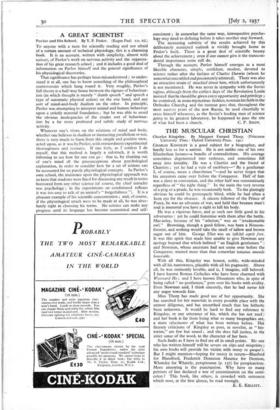THE MUSCULAR CHRISTIAN
Charles Kingsley. By Margaret Farrand Thorp. (Princeton University Press : Oxford University Press. t4s.)
CHARLES KINGSLEY is a good subject for a biographer, and hardly less so for a satirist. He is not unlike one of his own Elizabethan heroes—a bundle of contradictions. His courage sometimes degenerated into rashness, and sometimes fell away into timidity. He was a Chartist and the friend of Chartists ; yet he had a vein of snobbery—" By a gentleman I, of course, mean a churchman "—and he never forgot that his ancestors came over before the Conqueror. Half of him was a slave to convention, and the other half was ostentatiously regardless of " the right thing." In the main the very reverse of a prig or a prude, he was occasionally both. To the glaringly obvious he could be grotesquely blind, while he had often a keen eye for the obscure. A sincere follower of the Prince of Peace, he was an advocate of war, and held that because man's soul is immortal you have a right to kill his body.
He was a vigorous hater, and as such saw little good in his adversaries : yet he could fraternise with them after the battle. Mac aulay, because of his "atheism," was an " irredeemable owl." Browning,- though a good fellow, was born a Noncon- formist, and nothing would take the smell of tallow and brown sugar out of him. George Eliot was an infidel esprit fort. It was this spirit that made him unable to give Newman any apology beyond that which befitted " an English gentleman " : and Newman, whose ancestors had not come over before the Conqueror, wanted more than that somewhat tenuous amende honorable.
With all this, Kingsley was honest, noble, wide-minded with all his narrowness, placable with all his pugnacity. Above all, he was eminently lovable, and is, I imagine, still' beloved. I have known Roman Catholics who have been charmed with Westward Ho ; and I have known Dissenters who, in spite of being called " no gentlemen," pore over his books with avidity. Even Newman said, I think sincerely, that he had never felt any anger towards him.
Miss Thorp has made good use of her opportunity. She has searched for hdr materials in every possible place with the utmost diligence, and has unearthed much that has hitherth been unknown. It would be hard to find any reference to Kingsley, or any utterance of his, which she has not read': and her book is far from being what so many biographies are, a mere rifacimento of what has been written before. Her literary criticisms of Kingsley as poet, as novelist, as " his- torian," are few but sound ; and she does full justice, in the strict sense of the word, to the character of her hero.
Such faults as I have to find are all in small points. No one who has written himself will be severe on slips and misprints ; his own books will provide his victim. with many to guogue's. But I might mention—hoping for mercy in return--Blanford for Blandford, Frederick Dennison Maurice for Denison, Whateley for Whately, perspicuous (p. 137) for perspicacious. More annoying is the punctuation. Why have so many printers of late declared a war of extermination on the semi- colon ? This book, like others, is crowded with sentences which must, at the first glance, be read wrongly.
.E.. E. KELLETT.


















































 Previous page
Previous page